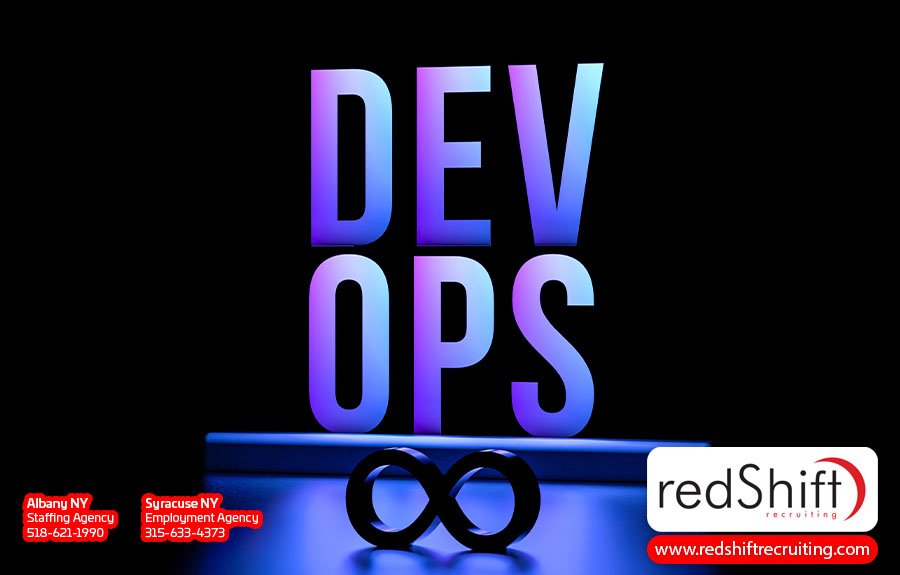Is a DevOps Job a Good Career for You?
So you're considering a DevOps career? It's a great choice! One of the highest paid jobs in IT, DevOps is also a rapidly developing field with plenty of room for growth. So, what is DevOps, and what does it take to be a successful DevOps engineer? In this article, we'll cover basic questions that many job seekers (or inquisitive web surfers!) have about starting a career in DevOps, such as what DevOps is, how long it takes to become a DevOps professional, and what skills and technologies are necessary for success in this field.
What Is DevOps?
The term "DevOps" merges the words "development" and "operations." In the process of software and application development, these two teams traditionally operate separately and have very different goals and responsibilities. The basic goal of the DevOps approach is to help software development teams and IT operations teams work together in a more productive and efficient way throughout the software development life cycle. While the development team is focused on creating new products, making updates or modifications, and releasing new features, the IT operations team monitors released products and ensures they are operating correctly and efficiently. DevOps aims to bring these two teams together, promoting collaboration and information sharing, and ultimately building a better product.
Using strategies such as workflow automation, cloud computing, configuration management, CI/CD (continuous integration/continuous development) tools, and other methods, the DevOps framework can be used to improve process efficiency and reliability. Additionally, the DevOps environment improves the development process by facilitating communication and collaboration between teams, delivering completed products faster through automation tools and the elimination of unnecessary delays, and ensuring projects meet all quality standards, business needs, and customer expectations.
The DevOps model is often portrayed as a loop, signifying the continuous and constant improvement that the cycle aims to achieve. DevOps teams follow the stages of this process, beginning with Planning, then moving on to Coding, Building, Testing, Releasing, Deploying, Operating, and Monitoring, and finally back to Planning. They start by gathering the project requirements and planning the product specifications. Development teams then go through the steps of coding, building, and testing to develop the application. The product continues through the release and deployment stages and into the operation stage, where teams work to make sure the application runs correctly and efficiently and begin to collect feedback for improvements and future development projects. The application continues to be monitored to identify issues, assess how the product is being used, and gauge user reception. These insights can then be analyzed and fed back into the development process for future versions or new products. Finally, the DevOps process restarts with the Plan stage to implement improvements, modifications, or new features based on the collected data.
What Are the Responsibilities of DevOps Professionals?
Essentially, DevOps is the practice of integrating software development and operations teams. It involves using tools, automation, and other techniques to ensure that software gets developed quickly, but is also tested thoroughly and deployed securely. The DevOps Engineer works with developers, system administrators, network engineers, and other IT professionals at all stages of the process to ensure that applications are properly developed, tested, and delivered. DevOps engineers are responsible for a range of tasks and responsibilities which contribute to the overall success of software development projects and IT infrastructure. DevOps professionals' responsibilities can include:
Oversight of deployments and releases
Collaboration with developers, QA, and operations staff
Configuration management and automation
Monitoring and logging of systems
Application performance management
Managing cloud infrastructure
Service discovery and orchestration
Security management
Providing training on DevOps practices
Maintaining up-to-date knowledge of DevOps-related technologies and trends
Do DevOps Engineers Need Coding?
DevOps does require coding skills and a DevOps role can involve managing code updates, editing and improving code, and automating tasks and processes to make development and operations more efficient and agile. This means that you need to have a solid understanding of how software works, as well as the ability to write code and use various scripting and programming languages. These can include Python, Java, PERL, PHP, Bash, JavaScript, PowerShell, Ruby, Golang, and more. Some DevOps roles may use a specific programming language, while others may require a broader skill set.
What Skills Do You Need to Be a DevOps Engineer?
DevOps professionals aren't just experts in DevOps methodology. They need strong project management skills and an understanding of both the development and operations processes in order to work effectively with both teams as well as other IT professionals. Other DevOps skills include strong technical skills and knowledge in areas including continuous integration, cloud systems, testing methodologies, scripting skills, automation, IT operations, coding and code deployment, security, and Linux administration, as well as other DevOps tools.
To have a successful career in DevOps, however, you'll need more than just technical expertise and coding and programming skills. A key part of succeeding in DevOps careers is having the right soft skills. For example, strong communication, collaboration, and interpersonal skills are invaluable, as you will need to be able to work effectively with other DevOps team members and stakeholders. The DevOps culture is often fast-paced, and DevOps jobs require working on challenging projects where priorities can change rapidly. This environment means a DevOps professional must be an adaptable and proactive problem-solver who is able to manage stress and handle pressure while under tight deadlines. Professionals in this career path should be team players with a commitment to efficient operations, customer satisfaction, and quality software products. Because the DevOps field continues to evolve, DevOps engineers must also be lifelong learners and stay up-to-date on the latest trends, tools, and best practices.
How Do You Become a DevOps Engineer?
There is no single career path for those interested in a DevOps role, whether you're just starting your career or you are an experienced software developer, security engineer, system administrator, or other IT professional looking to transition into DevOps. Entering this field will require developing your skills and understanding DevOps philosophy and technologies, as well as various programming languages and tools. Many employers will also expect you to have at least a bachelor's degree in a related field such as computer science, and earning industry certifications in relevant tools or technologies may help you hone your skills and stand out as a candidate. To enter this field, work on gaining experience in the software development lifecycle, coding, automation tools, configuration management, system administration, and cloud computing. Finally, work with an IT Recruiter to start making professional connections and learn about opportunities to start your career in DevOps.
How Long Does It Take to Become a DevOps Engineer?
There is no standard answer to this question, as becoming a DevOps engineer can take anywhere from several months to several years of training and experience. Depending on your background, you may need to obtain additional training to learn DevOps or get certified in certain tools or technologies. However, if you're willing to put in the time and effort, a career in DevOps can be very rewarding, both professionally and financially.
Can You Become a DevOps Engineer Without a Degree?
Many successful DevOps engineers do have a degree, especially in computer science or another technical field. However, there are also talented and skilled DevOps engineers who don't have a formal education. Ultimately, what matters most is having the right skills and experience to succeed in the field - regardless of whether you have a degree or not.
Do You Need a Certification for DevOps?
There is no single certification that is required for a career in DevOps, and as with most IT positions, strong technical skills or experience can carry more value than a degree or certification for some employers. That said, certifications can give you an advantage over other job candidates, support your negotiations for a raise or promotion, develop or improve your skills, or help you make a career move. Some popular certifications to consider include:
Amazon Web Services (AWS) Certified DevOps Engineer
AWS Certified Cloud Practitioner
AWS Certified Solutions Architect
AWS Certified SysOps Administrator
Certified Agile Service Manager (CASM)
Certified Jenkins Engineer (CJE)
Certified Kubernetes Administrator (CKA)
Certified Kubernetes Application Developer (CKAD)
Cloud Practitioner Certification
Docker Certified Associate (DCA)
HashiCorp Certified: Vault Associate
Kubernetes and Cloud-Native Associate (KCNA)
Linux Foundation Certified System Administrator (LFCS)
Microsoft Certified: DevOps Engineer Expert (Azure DevOps Engineer Expert)
Professional Cloud DevOps Engineer
Prometheus Certified Associate (PCA)
Puppet Certified Professional
Red Hat Certified Engineer (RHCE)
Red Hat Certified Specialist in OpenShift Administration
Becoming a certified DevOps professional can potentially help you advance in your career, so it is worth considering. The certifications listed above are just a few of the many options to choose from, so do your research to determine which will be the most beneficial for your work. Whether you decide to pursue DevOps certification will depend on your individual career path and goals.
Is DevOps a High Paying Job?
DevOps is one of the highest paying jobs in IT. The DevOps market continues to grow rapidly as more companies are implementing a cultural shift that moves away from organizational silos and promotes better collaboration, improves software delivery and development processes, enables automation, and reliably delivers quality products. There is a strong demand for DevOps talent, and this field offers many opportunities for advancement and earning potential. DevOps Engineers in major US cities typically make between $120,000 and $165,000 per year, and DevOps roles' salaries generally fall within a range of $80,000 to $200,000.
Is DevOps Stressful?
DevOps work can be stressful. This is especially true for DevOps Engineers who work in fast-paced environments and are expected to adapt quickly as business needs change. However, with the right skills and mindset, you can manage stress effectively and thrive in this field.
Does DevOps Have a Future?
DevOps is a growing field, and DevOps positions have a bright career outlook. As businesses continue to focus on improving software delivery and becoming more agile in the digital age, the demand for skilled DevOps practitioners will only continue to grow.
Opportunities in DevOps
The DevOps career path offers excellent opportunities for those looking for long-term job growth, and there are many positions that fall under the DevOps umbrella. Members of the DevOps team can include DevOps architect, DevOps release manager, DevOps test engineer, or site reliability engineer, to name a few. DevOps experts with strong leadership skills can be promoted to be DevOps Managers or other senior roles. Since DevOps is a methodology or culture shift rather than a specific set of tools or technologies, various positions involved in the software development and deployment process can implement the DevOps philosophy and be part of the DevOps team.
Is a Career in DevOps Right for You?
So, is DevOps a good career choice? If you have the right skills, mindset, and a passion for continuous improvement, a DevOps role could be an excellent option to consider. This is an exciting field of IT that is experiencing rapid advancements and has many opportunities for career growth and development. Do your research and learn more about DevOps to determine if DevOps work appeals to you. If you're looking for a challenging and rewarding career path with great earning potential, then DevOps may be the perfect choice!
Article Author:
Ashley Meyer
Divisional Business Coordinator
Albany, NY






